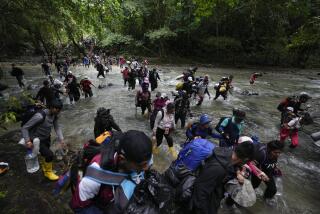Ex-Bush Aide Said to Upset Bid to Oust Noriega
- Share via
WASHINGTON — A former aide to Vice President George Bush apparently spoiled efforts last fall to oust Panama strongman Manuel A. Noriega by proposing an alternative plan allowing him to stay in power past November’s U.S. presidential election, Noriega’s former adviser has told Senate investigators.
Retired Adm. Daniel J. Murphy, Bush’s chief of staff until 1985 and now a consultant, reportedly told Noriega at a meeting in Panama City that “anything could happen” after the U.S. presidential vote if the Panamanian strongman agreed to his alternative proposal, Jose I. Blandon, the former Noriega adviser, testified Wednesday in a Senate hearing.
Bush had announced his presidential candidacy a month earlier. Blandon has privately emphasized to Senate investigators that he is not suggesting that Bush had endorsed Murphy’s plan because he was not in the meeting and knew only what Noriega had told him.
Lost Interest in Talks
Nonetheless, after meeting with Murphy three months ago, Blandon has told investigators, Noriega lost interest in possible talks with the State Department on relinquishing power sooner.
Noriega, who was under intense U.S. government pressure to resign as Panama’s military commander, was indicted by two federal grand juries in Florida last Friday on narcotics and money-laundering charges linked to the shipment of massive amounts of marijuana and cocaine into the United States.
Blandon served as Panama’s consul general in New York until last month when he split with Noriega and began supplying information to U.S. authorities investigating the military leader.
Blandon said that Murphy reportedly discussed his alternate plan for Noriega’s future in a meeting with Noriega in the first week in November.
Murphy has acknowledged meeting with Noriega, but he has declined to discuss the reason for the visit. He told the Washington Post last month that he had been asked by American businessmen interested in Panama’s stability to explore the possibility of representing them or the Panamanian government.
Blandon quoted Noriega on Wednesday as saying that in the November meeting, Murphy claimed to be a private emissary of Secretary of State George P. Shultz and Lt. Gen. Colin L. Powell, the national security adviser.
Both the State Department and the National Security Council gave briefings on Panama to Murphy before the visit, officials have said, but both have disavowed any official ties with Bush’s former aide.
Murphy also spoke with Vice President Bush’s national security adviser, Donald Gregg, at least once about the Noriega meeting and about the “business climate” in Panama, a Bush spokesman confirmed Wednesday. Steve Hart, the spokesman, said that the discussion occurred after the Noriega visit. He said he did not know whether Gregg and Murphy had met before the trip. Gregg could not be reached for comment.
Murphy did not return telephone calls seeking his comment on the matter.
Murphy’s meeting in Panama came at a sensitive time in U.S. efforts to secure Noriega’s departure from his military post, which overshadows Panama’s presidency.
Roughly a week earlier, Blandon, who was Noriega’s chief political adviser, had secretly asked the State Department’s chief Latin American official to agree to a plan allowing Noriega to resign in March or April in exchange for immunity from U.S. prosecution on drug-smuggling charges.
Blandon testified Wednesday that the official, Elliott Abrams, could not promise that Noriega would not be prosecuted but “seemed pleased” with the proposed swap.
Talks Tailed Off
But after meeting with Murphy, Blandon has told investigators, Noriega, who had been eager to pursue this option, lost interest and the negotiations tailed off.
Murphy was accompanied to his meeting with Noriega by South Korean lobbyist Tongsun Park, the central figure in a congressional bribery scandal a decade ago. Murphy has said Park was representing the same business interests who approached him. Investigators said that prominent Washington lobbyist Thomas Hale Boggs Jr. also made the trip to Panama City. Boggs’ role in the visit is unclear.
Blandon testified Wednesday that in his meeting, Murphy proposed a four-point plan that would have eased the military ruler from office after free elections in 1989--roughly a year after he would have departed under the other proposal.
The Murphy plan, a copy of which was released by the Senate subcommittee Wednesday, offered to allow Noriega to stay in office while Panama’s authoritarian government was remodeled along more democratic lines.
Noriega thus would remain as military commander into 1989 while his corps of military advisers and other powerful politicians was dismantled and elections were scheduled. Word of that aspect reportedly caused nervousness among the officer corps.
In addition, Panama would restore press freedom and civil rights and grant amnesty for political crimes. According to Blandon, Murphy and Park also pledged to secure Japanese economic assistance for Panama.
While Noriega’s political role was to end in 1989 under the Murphy plan, Blandon testified that Noriega implied that even that was not certain. Murphy had told him, Noriega said, that in 1988 “there would be elections in the U.S., and anything could happen” after that.
In his testimony to the Senate Foreign Relations subcommittee on terrorism, narcotics and international operations, Blandon said that Murphy’s alternative plan caused some confusion in Noriega’s ranks. Blandon said that he later told Abrams the United States was “playing two games” with Panama.
“Until then,” Blandon said, “it had been clear that the U.S. Senate and the Congress shared a position regarding Panama” favoring Noriega’s ouster. Murphy’s offer, he said, left the Panamanian government uncertain of the U.S. stance toward Noriega’s regime.
Abrams and the State Department’s undersecretary for political affairs, Michael H. Armacost, later told him that Murphy was not acting for the U.S. government, Blandon testified.
More to Read
Sign up for Essential California
The most important California stories and recommendations in your inbox every morning.
You may occasionally receive promotional content from the Los Angeles Times.













